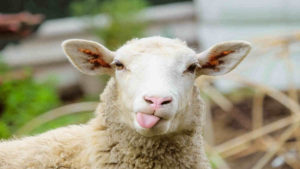An ASX-listed company wants to do what with my collagen?

Holista harvests Halal-certified collagen from “disease-free Australian sheep”. Pic: Getty
“Health-style” play Holista (ASX:HCT) is spending $1 million retrofitting a factory in Western Australia, to make halal-certified collagen from “disease-free Australian sheep”.
The collagen is destined for the food supplement market – think protein powders for wannabe buff gym bunnies – and will add four tonnes of food-grade collagen a month to its current production of up to two tonnes of cosmetic-grade collagen.
San Francisco-based marketer iGalen has agreed to buy the raw feedstock to create their own branded drink supplement product range.
Collagen from sheep “does not have the religious or cultural sensitivities compared to collagen from cows or pigs (shunned by certain religious groups),” the company said in a statement.
“The use of ovine collagen can also avoid the potential of ‘mad cow’ disease or avian diseases (associated with chickens). Australian sheep grade is certified by the US Department of Agriculture to be free from disease.”
Stockhead could find no evidence of diseases crossing the sheep-human species barrier via collagen, but chief Dato Dr Rajen Manicka said sheep in Australia were the only disease-free and prion-free collagen source in the world.
“Every inhabited continent in the World – apart from Australia – has diseases in their sheep. This a major differentiation for Holista as no other company on the planet can produce collagen from the skin of sheep based on our patent,” he said.
This is the second time Holista executives have announced the start of halal sheep collagen production.
In 2015 Holista launched the “world’s first food grade sheep collagen”, sold under the Ovinex brand.
This announcement is the completion of that deal, following product testing.
“We have now built the plant to produce Ovinex. Now, we will be commissioning this and starting the supply to the first customer at the end of 2017,” Dr Manicka said.
Back then, Holista was targeting sales of 5 grams a day or 150 grams a month. With the latest production line they are citing 3-10 milligrams a day.
They are hitting the US, Korean, Japanese and Chinese markets. The company says the latter could be worth $US11.7 million a year ($14.8 million), with collagen prices right now at $US42,000 a tonne ($53,000).
“We have rejected orders for annual supply contracts (from one China company) of around 280 tonnes per annum as we could not produce this much efficiently,” Dr Manicka said.
“Our current plant is a mid-scale production plant and we will need to get a full-scale plant to cater for these volumes.”
Holista’s shares have recently traded at the bottom of their 10c to 19c range over the past year. Holista’s market cap is $18.1 million.
UNLOCK INSIGHTS
Discover the untold stories of emerging ASX stocks.
Daily news and expert analysis, it's free to subscribe.
By proceeding, you confirm you understand that we handle personal information in accordance with our Privacy Policy.








